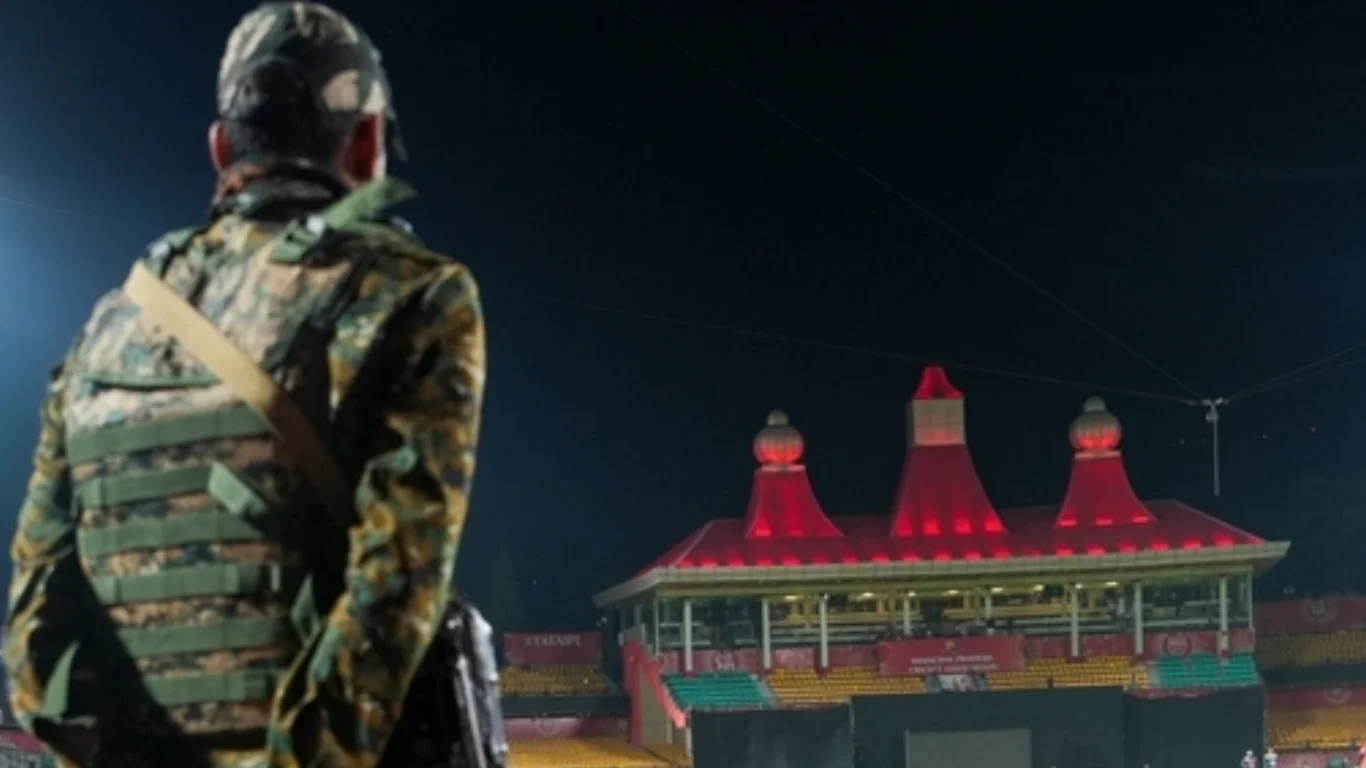
On May 8, 2025, the Indian Premier League (IPL) witnessed an unprecedented disruption as the highly anticipated match between Punjab Kings (PBKS) and Delhi Capitals (DC), held at the scenic Himachal Pradesh Cricket Association (HPCA) Stadium in Dharamsala, was abruptly called off due to serious security concerns stemming from rapidly escalating tensions between India and Pakistan. What began as a rain-affected match soon transformed into a high-stress security emergency. The game, already delayed by 90 minutes due to a wet outfield, had just begun gaining momentum when it was unexpectedly halted at 10.1 overs with PBKS in a dominant position at 122/1. Opening batsman Priyansh Arya had set the tone with an aggressive knock, smashing 70 runs featuring six towering sixes and five boundaries, while Prabhsimran Singh, unfazed by the tense backdrop,
remained unbeaten on 50—marking his fourth consecutive half-century and etching his name in IPL history as the first uncapped player to achieve such a feat. However, the cricketing spectacle was cut short as a sudden malfunction of one of the stadium’s towering floodlights plunged parts of the ground into darkness. What initially appeared to be a technical glitch rapidly escalated into a full-blown security evacuation when officials received an urgent call from a senior cricket authority warning of a credible aerial threat emanating from Pakistan, particularly alarming given Dharamsala’s proximity to Pathankot—a military installation city just 90 kilometers away that had reportedly been targeted in a failed aerial attack by Pakistani forces earlier that very day.
Spectators were promptly instructed to leave the stadium, while players and team staff were hurriedly escorted off the field amid growing panic. According to one player, confusion reigned backstage: “We were told about attacks in nearby Pathankot. We were asked to return to the hotel immediately. There was some panic… Delhi Capitals ended up boarding the Punjab team bus and vice versa. We wanted to get out quickly, but a huge crowd made movement difficult. The foreign players were visibly worried, and many even expressed a desire to return home immediately.” The unusual scene of IPL players being driven back to their hotel still dressed in match kits captured the gravity of the situation, highlighting how swiftly events had spiraled.
IPL chairperson Arun Dhumal was seen gesturing from the boundary line, urging fans to evacuate swiftly and calmly. At the administrative level, the Board of Control for Cricket in India (BCCI) sprang into action. Vice-president Rajeev Shukla addressed the media shortly after, explaining that the Board was in close contact with the central government and security agencies, and would review the situation before taking a final call on the continuation of the tournament. He assured fans and franchises that safety would remain the top priority. As a precautionary measure, and with airports across northern India including Dharamsala and Chandigarh being shut for civilian operations, the BCCI began considering alternate transportation options such as train travel for teams still scheduled to compete in the region. The logistical challenges only compounded the uncertainty surrounding the fate of IPL 2025. Meanwhile, franchise owners were said to be in constant touch with their overseas players and support staff, some of whom were understandably shaken by the unfolding crisis.
Contingency plans were reportedly being drawn up to arrange immediate departures for any international players unwilling to remain in India under the prevailing circumstances. This incident coincided with heightened military activity along the India-Pakistan border. That very night, Pakistan reportedly launched air raids targeting Indian cities near the border, including Jammu, Pathankot, and key areas in Punjab and Rajasthan. Although India’s air defence systems effectively neutralized the attacks, the psychological impact was evident nationwide, with air raid sirens sounded in cities like Chandigarh and Patiala, schools closed across Punjab, and military installations placed on high alert. These military tensions and their spillover into civilian life cast a long shadow over the IPL, an event historically seen as a national celebration of sport, entertainment, and unity. The abandoned PBKS vs DC match was officially declared a no-result, with both teams awarded one point each. In a further step that underscored the gravity of the situation, the next scheduled match between PBKS and Mumbai Indians,
originally set to take place in Dharamsala, was swiftly relocated to Ahmedabad—a venue considered safer given the southern location and relatively lower risk of cross-border aggression. The rapid response from the BCCI, local law enforcement, and security agencies was widely acknowledged as decisive, though the larger question loomed over the continuation of the remaining IPL fixtures. With high-stakes knockout matches approaching and overseas players on edge, the IPL governing council is now working around the clock, engaging with government agencies, franchise owners, broadcasters, and security experts to determine the most viable path forward. As the tension continues to unfold across northern India, the BCCI has assured stakeholders that the league will proceed only under conditions that guarantee the safety and well-being of players, staff, and fans alike. What remains to be seen is whether IPL 2025 can recover from this sudden, jarring interruption, or if the specter of geopolitical conflict will succeed in overshadowing the subcontinent’s premier cricketing spectacle. Regardless, the events of May 8, 2025, have left an indelible mark on the tournament’s history, reminding everyone that even the world of sport is not immune to the tremors of real-world conflict.

















